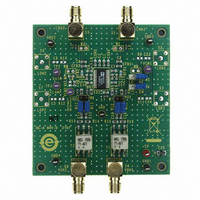AD8332-EVALZ Analog Devices Inc, AD8332-EVALZ Datasheet - Page 25

AD8332-EVALZ
Manufacturer Part Number
AD8332-EVALZ
Description
BOARD EVAL FOR AD8332
Manufacturer
Analog Devices Inc
Series
X-AMP®r
Specifications of AD8332-EVALZ
Channels Per Ic
1 - Single
Amplifier Type
Variable Gain
Output Type
Differential
Slew Rate
1100 V/µs
-3db Bandwidth
100MHz
Current - Output / Channel
45mA
Operating Temperature
-40°C ~ 85°C
Current - Supply (main Ic)
27.5mA
Voltage - Supply, Single/dual (±)
4.5 V ~ 5.5 V
Board Type
Fully Populated
Utilized Ic / Part
AD8332
Silicon Manufacturer
Analog Devices
Application Sub Type
Variable Gain Amplifier
Kit Application Type
Amplifier
Silicon Core Number
AD8332
Kit Contents
Board
Lead Free Status / RoHS Status
Lead free / RoHS Compliant
The linear-in-dB, gain control interface is trimmed for slope and
absolute accuracy. The gain range is +48 dB, extending from
−4.5 dB to +43.5 dB in LO gain and +7.5 dB to +55.5 dB in HI
gain mode. The slope of the gain control interface is 50 dB/V,
and the gain control range is 40 mV to 1 V. Equation 1 and
Equation 2 are the expressions for gain.
GAIN (dB) = 50 (dB/V) × V
or
GAIN (dB) = 50 (dB/V) × V
The ideal gain characteristics are shown in Figure 73.
The gain slope is negative with MODE pulled high (where
available), as follows:
GAIN (dB) = −50 (dB/V) × V
or
GAIN (dB) = −50 (dB/V) × V
The LNA converts a single-ended input to a differential output
with a voltage gain of 19 dB. If only one output is used, the gain
is 13 dB. The inverting output is used for active input impedance
termination. Each of the LNA outputs is capacitively coupled to
a VGA input. The VGA consists of an attenuator with a range of
48 dB followed by an amplifier with 21 dB of gain for a net gain
range of −27 dB to +21 dB. The X-AMP, gain interpolation
technique results in low gain error and uniform bandwidth, and
differential signal paths minimize distortion.
The final stage is a logic programmable amplifier with gains of
3.5 dB or 15.5 dB. The LO and HI gain modes are optimized for
12-bit and 10-bit ADC applications, in terms of output-referred
noise and absolute gain range. Output voltage limiting can be
programmed by the user.
–10
60
50
40
30
20
10
0
0
Figure 73. Ideal Gain Control Characteristics
0.2
ASCENDING GAIN MODE
DESCENDING GAIN MODE
(WHERE AVAILABLE)
0.4
GAIN
GAIN
GAIN
GAIN
HILO = LO
HILO = HI
V
− 6.5 dB, (HILO = LO)
+ 5.5 dB, (HILO = HI)
GAIN
+ 45.5 dB, (HILO = LO)
+ 57.5 dB, (HILO = HI)
0.6
(V)
0.8
1.0
1.1
Rev. G | Page 25 of 56
(1)
(2)
(3)
(4)
LOW NOISE AMPLIFIER (LNA)
Good noise performance in the
relies on a proprietary ultralow noise preamplifier at the beginning
of the signal chain, which minimizes the noise contribution in the
following VGA. Active impedance control optimizes noise per-
formance for applications that benefit from input matching.
A simplified schematic of the LNA is shown in Figure 74. INH
is capacitively coupled to the source. A bias generator establishes dc
input bias voltages of 3.25 V and centers the output common-
mode levels at 2.5 V. A capacitor C
the input coupling capacitor C
pin to ground to decouple the LMD bus. The LMD pin is not
useable for configuring the LNA as a differential input amplifier.
The LNA supports differential output voltages as high as 5 V p-p,
with positive and negative excursions of ±1.25 V, about a
common-mode voltage of 2.5 V. Because the differential gain
magnitude is 9, the maximum input signal before saturation is
±275 mV or +550 mV p-p. Overload protection ensures quick
recovery time from large input voltages. Because the inputs are
capacitively coupled to a bias voltage near midsupply, very large
inputs can be handled without interacting with the ESD protection.
Low value feedback resistors and the current-driving capability
of the output stage allow the LNA to achieve a low input-referred
voltage noise of 0.74 nV/√Hz. This is achieved with a current
consumption of only 11 mA per channel (55 mW). On-chip
resistor matching results in precise single-ended gains of 4.5×
(9× differential), critical for accurate impedance control. The use
of a fully differential topology and negative feedback minimizes
distortion. Low HD2 is particularly important in second harmonic
ultrasound imaging applications. Differential signaling enables
smaller swings at each output, further reducing third-order
distortion.
R
S
C
INH
Figure 74. Simplified LNA Schematic
C
SH
INH
LOP
AD8331/AD8332/AD8334
3.25V
2.5V
60Ω
–a
INH
I
C
0
AD8331/AD8332/AD8334
Q1
IZ
) is connected from the LMD
LMD
I
0
BIAS
VCM
VPOS
40Ω
(can be the same value as
Q2
R
I
IZ
I
0
0
2.5V
3.25V
80Ω
LON
–a
VGA
TO
LMD
C
LMD













